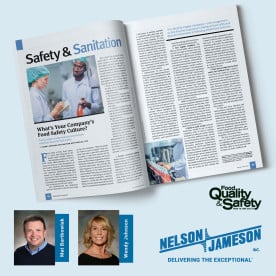 When one hears "E.coli," in reference to food safety issues, the average consumer might think of outcomes like diarrhea or stomach cramps. It may be a surprise for many customers and food industry workers that E.coli can also mean urinary tract infections (UTIs).
When one hears "E.coli," in reference to food safety issues, the average consumer might think of outcomes like diarrhea or stomach cramps. It may be a surprise for many customers and food industry workers that E.coli can also mean urinary tract infections (UTIs).
This is indeed the case. E.coli is responsible for 80-85% of all urinary tract infections, generally (Nicolle 2). A cystitis (bladder infection) occurs when the lower urinary tract is affected. Keeping this in mind, a recent study in Clinical Microbiology and Infection brings some attention to "a multidrug-resistant clonal group" that "may be responsible for community epidemics" of UTIs in the public today (Skjot, et. al). Within the food industry and amidst consumers, links between UTIs and E.coli may become more of concern due to a report on ABC News pertaining to the rise of "superbugs" that are resistant to antibiotics, and that are "transmitted to humans in the form of E. coli" in chickens.
The report declared that "more than 8 million women are at risk" of developing "difficult-to-treat bladder infections" from E.coli in meat sources, especially chicken. Maryn McKenna, a reporter for the Food & Environment Network, thinks the research indicates that: "we may in fact know where it's coming from. It may be coming from antibiotics used in agriculture" Yet, not everyone agrees with this interpretation of the existing research.
The National Chicken Council reacted with a swift denouncement of the ABC report and the research utilized within the report. In their statement, Randall Singer, associate professor of epidemiology at the University of Minnesota declared:
However this dialogue concludes, a new level of discussion has been reached in the debate concerning antibiotics in the meat industry. Nelson-Jameson offers antibiotic test screening kits that can assist your operation in determining the presence and concentration of antibiotics, a sure subject of discussion among consumers in the meantime. For more information on antibiotic test screening kits click here.
Print Sources:Nicolle LE. "Uncomplicated urinary tract infection in adults including uncomplicated pyelonephritis." Urol Clin North Am. 2008 Feb; 35(1):1-12, v. Review.
Skjøt-Rasmussen L, Olsen SS, Jakobsen L, Ejrnaes K, Scheutz F, Lundgren B, Frimodt-Møller N, Hammerum AM.
"Escherichia coli clonal group A causing bacteraemia of urinary tract origin" Clin Microbiol Infect. 2012 Jun 9. doi: 10.1111/j.1469-0691.2012.





